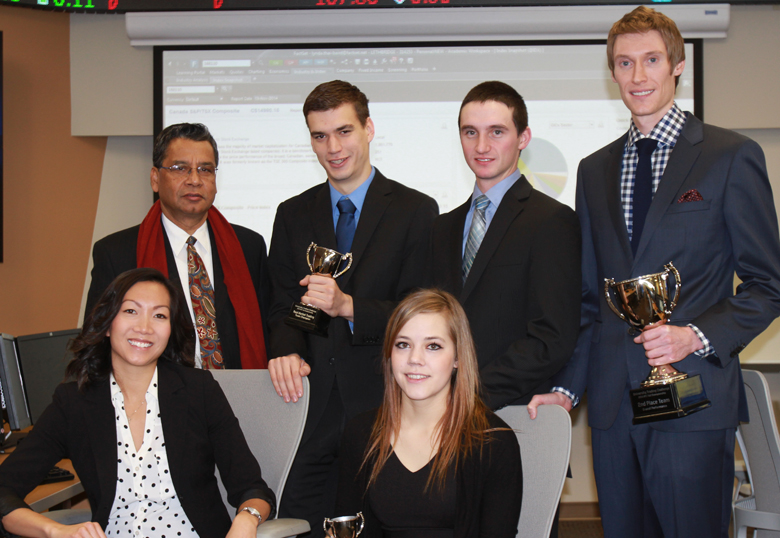Coaching sessions and simulated trading exercises helped a student team from the Faculty of Management place second overall at the recent 2014 University Trading Challenge in New York City.
The U of L team, consisting of Matthew Helfrich, Devin Phalen, Michael Kawchuk and Ashley Tymburski, were among 80 students from 12 universities to participate in the North American trading competition that started Oct. 13 and finished in New York City on Nov. 14. They were accompanied by Dr. Shamsul Alam, a finance professor and team coach, and Lynda Thai-Baird, manager of the Centre for Financial Market Research and Teaching facility known as the trading floor.
This is the first year the U of L has participated in the contest. To finish two points behind the first-place finisher, Fordham University, was a big achievement considering the U of L was the only Canadian team and the only undergraduate team to compete.
“It was definitely exciting to place with all those top schools,” says Tymburski.
“I was pretty excited. The team we lost out to is pretty accomplished, so I don’t feel bad losing to them,” says Helfrich.
“They did a fantastic job,” says Alam. “I’m very pleased we came second against all the graduate students. The U of L trading room helped them learn how to trade and the competition was in a trading room like ours, so they were confident when they went into it. I’m very proud of them.”
In the three weeks leading up to competition in New York, individuals from each team participated in a real-time market trading exercise based on daily news events. Tymburski came in first in the competition, with Phalen placing a close second.

“I haven’t actually traded personally. The other team members all have a little bit of trading experience so I was a little bit nervous about that. But it ended up turning out well for me,” says Tymburski, a fifth-year student working on a combined bachelor of management and bachelor of science degree.
At the competition, teams presented their investment strategies for two cases, one involving a methanol production company and the other for a gold exploration and mining company. The final part of the competition was a simulated trading exercise.
“We had a really good team. We all got along really well and we were dedicated to putting in the work and the hours to make sure we were successful,” says Helfrich. “The school offers a lot of these simulated market training programs and we do a lot of portfolio management projects, so we’re quite used to it. I think that gave us an advantage there.”
“We are a lot more confident now after going through this competition and are way more comfortable going forward,” says Phalen.
“I think we all took something out of it to help build ourselves and our personal portfolio,” says Kawchuk. “We were all very driven students going into it and I think that gave us the extra drive to do well in the competition. It was a fantastic team to be a part of.”
For Thai-Baird, the team’s performance is a solid indicator of the value of the trading floor.
“For us, as an institution, it shows that the things that we’re doing, especially with the investment that the Faculty of Management and the University has made in this facility to give students the practical experience they need, really does translate to how we’ve done in the competition,” says Thai-Baird. “I hope we can continue to provide these types of experiences for students because it appears that it has really changed their outlook and their confidence level. Hopefully we can continue to bring home additional hardware in the future.”
